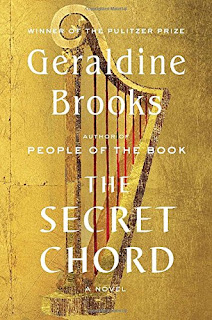By Paul Carrier
The highlights of the biblical David’s life are well-known. The legendary ruler killed the Philistine giant Goliath while still a shepherd boy, succeeded Saul as king and made Jerusalem his capital. A poet, harpist, singer and valiant warrior, he seduced (or raped) Bathsheba and fathered Solomon, who eventually succeeded him as king.
There are, of course, many holes in the story; even what is known could use some fleshing out. The Hebrew prophet Nathan, a seer and scribe, is said to have done just that, by writing histories of both David and Solomon, whom he knew well and advised. Unfortunately, though, both documents have been lost.
In The Secret Chord, Pulitzer Prize-winning author Geraldine Brooks gives voice to Nathan, who chronicles David's eventful life in a first-person account that overflows with vitality, brutality and grit. Brooks' David is charismatic and wise. Yet this passionate, sometimes misguided man is a mass of contradictions as well, at once creative and cruel, devout and sinful.
In The Secret Chord, Pulitzer Prize-winning author Geraldine Brooks gives voice to Nathan, who chronicles David's eventful life in a first-person account that overflows with vitality, brutality and grit. Brooks' David is charismatic and wise. Yet this passionate, sometimes misguided man is a mass of contradictions as well, at once creative and cruel, devout and sinful.
In Brooks’ able hands, Nathan finds himself channeling “the Name,” as God uses him to speak to David. This power makes Nathan an exhalted but feared outsider. He gives commands to his king, and even chides him when he does wrong, an insolence that David, a great but flawed ruler, tolerates because he believes Nathan is his direct link to the divine.
“I have never become used to it: the awe that common men have for my kind,” Nathan says in the novel. “I suppose it is because I feel no more than a common man myself. Even less, perhaps. No more than a tool in the hands of an unseen craftsman, something to be used as needed and then cast casually aside.”
The fascinating thing about Nathan, Brooks said in a recent National Public Radio interview, is that his major role is to turn up when David has failed or behaved badly “and to basically tell the king, you suck.” Nathan and the other Hebrew prophets “were some of the most disturbing men who ever lived,” Brooks said in that interview. “These are the goads in our hide, the stone in our shoe, the people who tell us what we don't want to hear.”
Nathan not only recalls his own dealings with David but adds other perspectives after the king orders family members to cooperate in the writing of Nathan’s chronicle. Exhausted by his status as the Name’s chosen vessel, Nathan interviews some of those who are close to his famed subject, such as Nizevet, David’s mother; Shammah, his resentful brother; and Mikhal, Saul’s daughter and David’s first wife.
The result is a novel that, although rooted in the biblical record, soars into the realm of the imagination to provide a muscular and well-rounded portrait. “I would never claim that I can tell you the truth of what happened 3,000 years ago,” Brooks said during an appearance on the Diane Rehm Show. “But my goodness, I had a lot of fun imagining how it might have been.”
We are told, for example, that David was despised as a child by his father and his older brothers. Brooks conveys the power of David’s singing voice, and the haunting skill (the secret chord) with which he played the harp. The tension is palpable when Saul, insane and consumed by jealousy, sets out to hunt and kill David, only to be thwarted by the latter’s shrewdness and the support he receives from Mikhal and her brother Yonatan.
Brooks provides a compelling look at key women in David’s life, including wives Mikhal, Avigail and Batsheba. (The author uses names in their transliteration from the Hebrew Bible. Thus, Bathsheba is Batsheba in The Secret Chord, Nathan is Natan, Solomon is Shlomo, Saul is Shaul, and Samuel is Shmuel.)
In an interview with Brooks released by her publisher, the author says she refuses to view David in black and white terms because it is “more interesting to accept the contradictions in his nature, the multi-faceted complexity of it.” The David of The Secret Chord is a murderer, a “criminally indulgent parent” and a ruler who abuses power, Brooks said. But he admits his mistakes, he listens to criticism and he has a “huge capacity for love.”
Brooks has given us a fully-realized David by applying the skills of a gifted novelist to a biblical record that is enticing but, unfortunately, woefully incomplete. Her David may be speculative, but he makes for a memorable and believable protagonist, a man who is at once practical and poetic, treacherous and mystical.


